
As part of our coverage of the 20th anniversary of Hurricane Katrina, we speak with longtime New Orleans activist Malik Rahim, co-founder of the Common Ground Collective. In the weeks after the storm, we interviewed Rahim in his neighborhood of Algiers. He showed us how a corpse still remained on the street, and we asked soldiers and police why it hadn’t been picked up. Twenty years later, we get an update from Rahim, who continues to grapple with Katrina’s long-term devastation. “The sad part about it [is] it could happen today,” says Rahim. “If a hurricane would happen right now, we are ill-prepared for it, the same way we was ill-prepared 20 years ago.”
Transcript
AMY GOODMAN: One person we interviewed in the neighborhood of Algiers was Malik Rahim, co-founder of the Common Ground Collective. On September 10th, 2005, we aired this report, when Malik took us around the corner from a community health center. He showed us how a corpse still remained on the street. It had been neglected since Hurricane Katrina hit. We asked soldiers and police why the corpse had not been picked up.
MALIK RAHIM: You could basically smell it from right here. You know, and the police, they pass by. They look at it, and — but they ain’t gonna do nothing, you know, to pick it up.
AMY GOODMAN: Malik then walked us down the driveway next to the health center and lifted up a sheet of corrugated metal marked with an X, revealing the dead body underneath.
MALIK RAHIM: Now, his body been here for almost two weeks. Two weeks tomorrow, all right, that this man’s body been laying here. And there’s no reason for it. Look where we at? I mean, it’s not flooded. There’s no reason for them — there’s no reason for them to be — left that body right here like this. I mean, that’s just totally disrespect. You know? And I mean two weeks. Every day, we ask them about coming and pick it up. And they refuse to come and pick it up. And you could see, it’s literally decomposing right here. Right out in the sun. Every day we sit up and we ask them about it. Because, I mean, this is close as you could get to tropical climate in America. And they won’t do anything with it.
AMY GOODMAN: Malik, do you know who this person is?
MALIK RAHIM: No. But regardless of who it is, I wouldn’t care if it’s Saddam Hussein or bin Laden. Nobody deserve to be left here. And the kids pass by here and they’re seeing it. I mean, the elderly. This is what’s frightening a lot of people into leaving. We don’t know if he’s a victim of vigilantes or what. But that’s all we know is that his body had been allowed to remain out here for over two weeks.
AMY GOODMAN: We’re standing right outside the health clinic. Its doors are chained. The building is not seriously damaged. Have you reached people there? What authorities have you talked to to pick up this body?
MALIK RAHIM: We done talked to everyone, from the Army to the New Orleans police to the state troopers to — I mean, we done talked to everybody who we can. I even talked to Oliver Thomas, who is the councilman-at-large, yesterday about this body. He said he was surprised to see that this body is still there. But it’s two weeks, two weeks that this man been just laying here.
AMY GOODMAN: As Malik Rahim was speaking, as if on cue, every level of authority he mentioned drove by.
There’s a — there’s a dead body right here. Is — who are you with?
SOLDIER: We’re with Bravo 15.
AMY GOODMAN: Which is?
SOLDIER: The Cav.
AMY GOODMAN: Army?
SOLDIER: Army, yes. Regular Army.
AMY GOODMAN: There’s a dead body right here. Can you guys pick it up?
SOLDIER: I don’t think we can pick it up, but we can call the local authorities to come and pick it up.
AMY GOODMAN: This gentleman who lives in the neighborhood said that they have been trying to get — here, let me ask these guys, too. Excuse me. Excuse me. Hi. There’s a dead body right here. Can Louisiana state troopers, can you pick it up?
LOUISIANA STATE TROOPER: You need to talk to our public information officer, Ma’am.
AMY GOODMAN: It’s been here for two weeks. We filmed it last week, and gentleman over here said he’s been trying to get it picked up for two weeks. And Louisiana state troopers, the police, the Army, no one has responded. We’re looking right over at it right there.
LOUISIANA STATE TROOPER 1: You need to talk to our public information officer and contact him at the troop.
AMY GOODMAN: Your name is?
LOUISIANA STATE TROOPER 1: You need to talk to our public information officer.
AMY GOODMAN: Do you know about the body?
LOUISIANA STATE TROOPER 1: You need to talk to our public information officer.
AMY GOODMAN: Sir, do you know about the body over there?
LOUISIANA STATE TROOPER 2: Ma’am, you talk with our public information officer.
AMY GOODMAN: Do you know what they should do to get this body removed?
ROBERT GONZALEZ: I have no idea. I can’t tell you. I don’t know. There’s been several people over here looking at it.
AMY GOODMAN: That was Homeland Security that just went by. Sir, what were you saying?
ROBERT GONZALEZ: There’s been several people over here looking at it, but, you know, like I said, I haven’t seen anybody take it.
AMY GOODMAN: Several Army guys?
ROBERT GONZALEZ: Army. I’ve seen police over here looking at it. Seen ambulances looking at it. That’s about it.
AMY GOODMAN: To our knowledge, the body was never identified.
AMY GOODMAN: Malik Rahim is the co-founder of the Common Ground Collective, which helped bring thousands of people from all over the world to help rebuild New Orleans after Hurricane Katrina. He was also one of the founders of the New Orleans chapter of the Black Panther Party for Self-Defense. In 2008, he was a congressional candidate for the Green Party. He’s joined us over the years since then. I recently went back to New Orleans and interviewed Malik Rahim again.
AMY GOODMAN: Malik, we are sitting here at the Morial Convention Center, where, 20 years ago, thousands of people were taking refuge from Hurricane Katrina. Your thoughts on what happened back then and the lessons for today?
MALIK RAHIM: Well, I would have to — first, I have to thank you for this time. When I think of what happened, not only here, I have to also think about what was happening in Algiers. And I have to think of the role that you and Democracy Now! played at that time. Most mainstream media was sold on the big lie that this city had resorted to anarchy, that it was taken over by thugs, and there was looting, there was murder, there was rapes that was going on, that now, 20 years later, we know that all this was false. But it was the excuse. It was the excuse in order to rid the city out of people that was no longer tolerated.
There was a difference between those who seek safety at the Superdome than those who seek safety here, because the ones at the Superdome was there seeking safety from Hurricane Katrina. But those that was here, those that was the tens of thousand that was stuck up in this building, wasn’t as cool as it is now, didn’t have many air. But they was fleeing a flood, a known flood. They was fleeing hurricane corruption, hurricane racism, you know? They were — that’s the hurricane that they was fleeing from. And they was unable to bring supplies with them. Most people, when that flood came, that’s all they had, was the clothes on their back. And then they had to wear these polluted clothes, because the water was polluted, the water was toxic. And they had to wear this for days. So, I think about the condition of those that was trapped here, and especially the children. You know, as an elder, I can understand. But, you know, because I’m in the twilight of my life. I’m seventy — I’ll be 78 in December, so I’m in the twilight of my life. But for to see children trapped up in here and dying needlessly.
AMY GOODMAN: Remind me, this was George W. Bush’s presidency. He had appointed as the head of FEMA, the Federal Emergency Management Agency —
MALIK RAHIM: Michael Brown.
AMY GOODMAN: — Michael Brown, who was — his specialty was Arabian horses. He was more concerned about the size of his cuffs on his — on his elbows, to show that he had rolled up his sleeves. And Bush said to him — what was his congratulatory message to Brown?
MALIK RAHIM: I can’t — I can’t remember what the Bush —
AMY GOODMAN: “Heck of a job, Brownie”?
MALIK RAHIM: Yeah, something like that.
AMY GOODMAN: And what about when the FEMA head, Brown, was asked about the people here at the Convention Center?
MALIK RAHIM: Well, he didn’t know they was here.
AMY GOODMAN: He said, “I don’t even know that they’re here.”
MALIK RAHIM: He ran his operation from Baton Rouge, so everything that he was seeing was secondhand. Everything that he was saying was secondhand. He wasn’t here. He was in — living the life of luxury in Baton Rouge, while people here was dying, you know? So, again, it shows what we went through then. But, Amy, the sad part about it, it could happen today. Déjà vu is alive and well here, because if a hurricane would happen right now, we are ill-prepared for it, the same way we was ill-prepared 20 years ago.
AMY GOODMAN: That’s Malik Rahim just a few weeks ago, sitting with me in the Convention Center in New Orleans, where so many thousands took refuge from Hurricane Katrina. Malik co-founded the Common Ground Collective, which helped bring thousands of people from all over the world to help rebuild New Orleans after Hurricane Katrina. He was also one of the founders of the New Orleans chapter of the Black Panther Party.
When we come back, we stay in New Orleans and speak with independent journalist Jordan Flaherty. Back in 20 seconds.
[break]
NERMEEN SHAIKH: Scenes of Mardi Gras Indians in the streets of New Orleans when Democracy Now! was there in 2006.



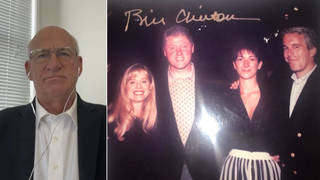
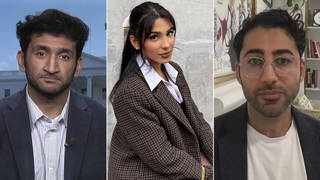





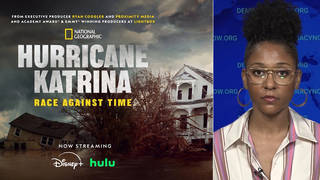
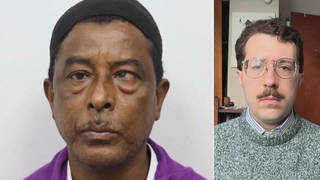
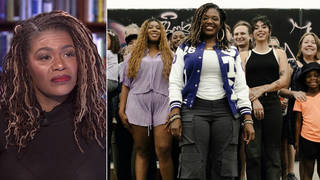
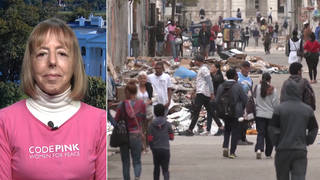
Media Options